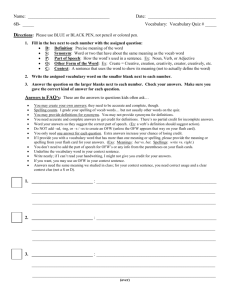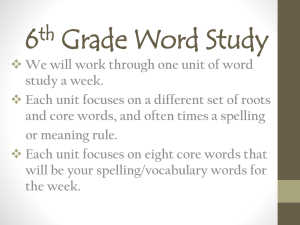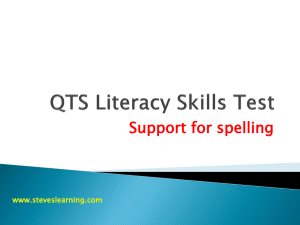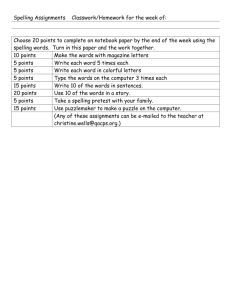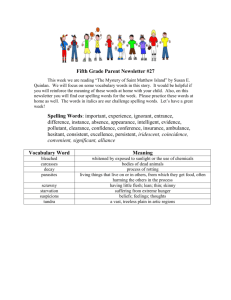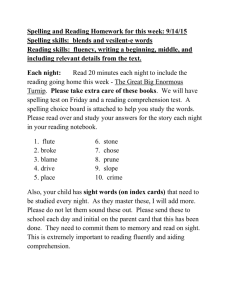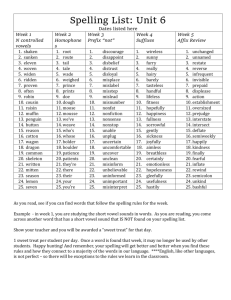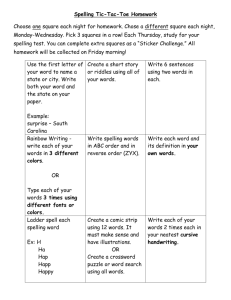Vocabulary Overview
advertisement
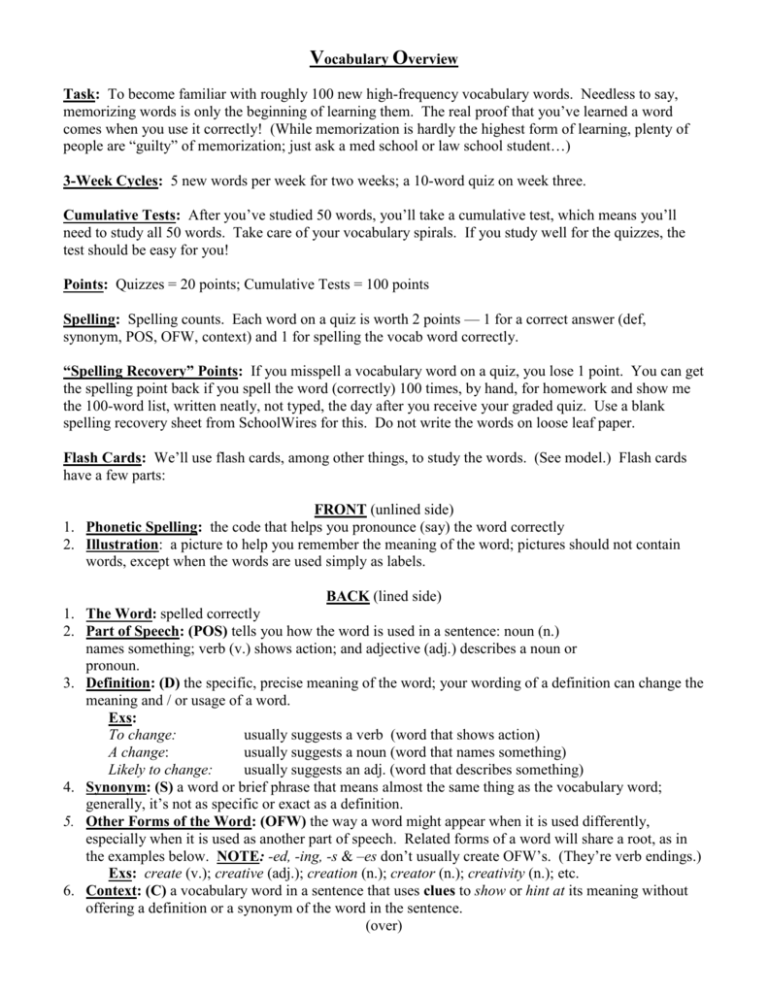
Vocabulary Overview Task: To become familiar with roughly 100 new high-frequency vocabulary words. Needless to say, memorizing words is only the beginning of learning them. The real proof that you’ve learned a word comes when you use it correctly! (While memorization is hardly the highest form of learning, plenty of people are “guilty” of memorization; just ask a med school or law school student…) 3-Week Cycles: 5 new words per week for two weeks; a 10-word quiz on week three. Cumulative Tests: After you’ve studied 50 words, you’ll take a cumulative test, which means you’ll need to study all 50 words. Take care of your vocabulary spirals. If you study well for the quizzes, the test should be easy for you! Points: Quizzes = 20 points; Cumulative Tests = 100 points Spelling: Spelling counts. Each word on a quiz is worth 2 points — 1 for a correct answer (def, synonym, POS, OFW, context) and 1 for spelling the vocab word correctly. “Spelling Recovery” Points: If you misspell a vocabulary word on a quiz, you lose 1 point. You can get the spelling point back if you spell the word (correctly) 100 times, by hand, for homework and show me the 100-word list, written neatly, not typed, the day after you receive your graded quiz. Use a blank spelling recovery sheet from SchoolWires for this. Do not write the words on loose leaf paper. Flash Cards: We’ll use flash cards, among other things, to study the words. (See model.) Flash cards have a few parts: FRONT (unlined side) 1. Phonetic Spelling: the code that helps you pronounce (say) the word correctly 2. Illustration: a picture to help you remember the meaning of the word; pictures should not contain words, except when the words are used simply as labels. BACK (lined side) 1. The Word: spelled correctly 2. Part of Speech: (POS) tells you how the word is used in a sentence: noun (n.) names something; verb (v.) shows action; and adjective (adj.) describes a noun or pronoun. 3. Definition: (D) the specific, precise meaning of the word; your wording of a definition can change the meaning and / or usage of a word. Exs: To change: usually suggests a verb (word that shows action) A change: usually suggests a noun (word that names something) Likely to change: usually suggests an adj. (word that describes something) 4. Synonym: (S) a word or brief phrase that means almost the same thing as the vocabulary word; generally, it’s not as specific or exact as a definition. 5. Other Forms of the Word: (OFW) the way a word might appear when it is used differently, especially when it is used as another part of speech. Related forms of a word will share a root, as in the examples below. NOTE: -ed, -ing, -s & –es don’t usually create OFW’s. (They’re verb endings.) Exs: create (v.); creative (adj.); creation (n.); creator (n.); creativity (n.); etc. 6. Context: (C) a vocabulary word in a sentence that uses clues to show or hint at its meaning without offering a definition or a synonym of the word in the sentence. (over) Extra Credit: If you ever see one of the vocabulary words we’re studying in something you’re reading, bring in a photocopy of the sentence with a “sentence sandwich,” including the sentence with the word as well as the sentence before it and the sentence after it. (Or, if you prefer, you may type the sentences instead of photocopying them.) Neatly cut out the sentences in a square or rectangular shape. Then put a HW heading on the back of the entry and leave the extra credit entry in my vocabulary mailbox. You may bring in a total of 10 entries per marking period, and each word is worth 1 extra credit point toward your assignments. If you and a classmate bring in the same occurrence of a word (from the same sentence of the same source), I usually award extra credit to the first word I come across in my extra credit box. First found, first served. (See separate extra credit handout for details.) Acceptable Sources: You may use words from almost anything that has text (printed words): a book, a magazine, a newspaper, the TV Guide, a cereal box, a comic book, playing cards, or even a candy wrapper. However, I can’t accept extra credit words from reference books — for example, a dictionary or a thesaurus — or from a searchable source, like the Internet. Sorry. I want you to find our vocabulary words naturally, as you’re reading, not by searching for the words. If you get a print edition of a newspaper, read some articles; you’re bound to notice our vocab words there… If you find a word in an e-book, that’s fine, but you’ll have to type it up or copy it from a traditional book to earn credit. Absence During Vocabulary: After an absence, you are responsible for getting the vocabulary work and assignments that you missed. See SchoolWires for a copy of the words and related handouts. Studying: I recommend that you study early and often, in small increments (little bits), rather than that you “cram” (study last-minute for a long time). Some research suggests that studying often helps you remember things for a longer period of time. Unfortunately, cramming usually leads to forgetting things sooner. So plan ahead and make time for studying. See the General Study Strategies handout for further advice on how to study for vocabulary. Using Words: I expect you to try to use the words you learn. The point of all this is to expand your vocabulary for reading, writing, speaking, and listening; the point is not just to ace vocabulary quizzes. In fact, I sometimes give HW assignments in which I ask you to use your recent vocabulary words in writing. Also, I hope you’ll try out new words in conversation. That’s what they’re for.
